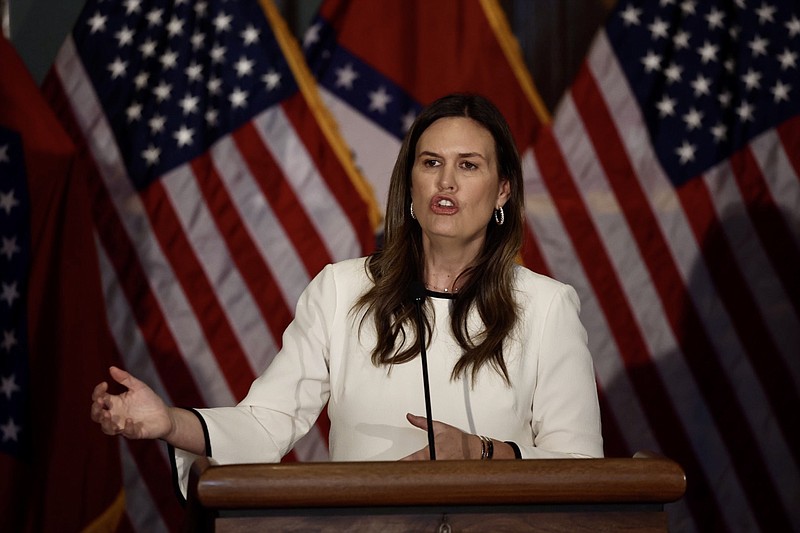Gov. Sarah Huckabee Sanders announced Friday that she is calling the Arkansas General Assembly into special session, starting Monday, to cut the state’s top individual and corporate income tax rates by 0.3% each, effective Jan. 1, 2024, and grant a $150 one-time tax credit for taxpayers making less than $90,000 a year, retroactive to Jan. 1, 2023.
The state’s top individual income tax rate is currently 4.7%, and the state’s top corporate income tax rate is currently 5.1%.
“It is no secret around the Capitol that tax cuts will be our top priority,” the Republican governor said.
She said two of Arkansas’ neighbors — Texas and Tennessee — don’t levy state income taxes and make it hard for Arkansas to be competitive at times.
“With President Biden’s big government policies making it even harder for people to make ends meet, every Arkansan needs a little extra money in their pocket,” she sa
Sen. Jonathan Dismang, R-Searcy, said the proposed cut in the state’s individual income tax rate would reduce state general revenues by $150 million a year and the proposed cut in the state’s top corporate income tax rate would cut state general revenues by $35 million a year.
The one-time tax credit for middle-income taxpayers would reduce state general revenues by $155 million, he said.
Sanders said she is also asking the Legislature to place $710 million in uncommitted state surplus funds into the Arkansas Reserve Fund in order to keep responsibly phasing out the state’s income tax entirely.
“These tax cuts go a long way toward shrinking government, but they are just one piece of the puzzle,” she said. “To make our government smaller we have to make it more efficient. To do so, we will also update Arkansas Freedom of Information Act.”
Sanders said she also wants lawmakers to ban covid-19 vaccine mandates for all Arkansas state employees.
In fiscal 2023 that ended June 30, Arkansas’ general revenue surplus reached $1.161 billion, the state Department of Finance and Administration reported in July.
The fiscal year 2023 surplus is state government’s second-largest general revenue surplus in any fiscal year, behind only the $1.628 billion surplus accumulated in fiscal 2022 that ended June 30, 2022. State government’s third-largest general revenue surplus totaled $945.7 million in fiscal 2021 that ended June 30, 2021.
In April, Sanders signed into law a bill that cut the state’s top individual income tax rate from 4.9% to 4.7% and the state’s top corporate income tax rate from 5.3% to 5.1%, retroactive to January 1, 2023.
The top individual income tax rate of 4.7% includes Arkansans reporting more than $87,000 in net income and is applied to any income over $8,800 for tax years starting on or after Jan. 1, 2023. That top rate included Arkansans having net income up to $87,000 and is applied to their income between $24,300 to $87,000 for tax years starting on or after Jan. 1, 2023.
The top corporate income tax rate of 5.1% applies to net income of corporations exceeding $25,000 for tax years starting on or after Jan. 1, 2023. The law signed into law in April is projected by the state finance department to reduce state general revenue by $186 million in fiscal 2024 and $124 million in fiscal 2025.
In April, Sanders also signed into law a bill that will gradually phase out the “throwback rule” on income of multistate corporations over a seven-year period, starting in the tax year starting on or after Jan. 1, 2024, and be complete in tax year 2030. The law is projected by the finance department to reduce general revenue by $10.6 million in fiscal year 2024 and ultimately reduce general revenue by $74 million a year in fiscal year 2030 and thereafter.
